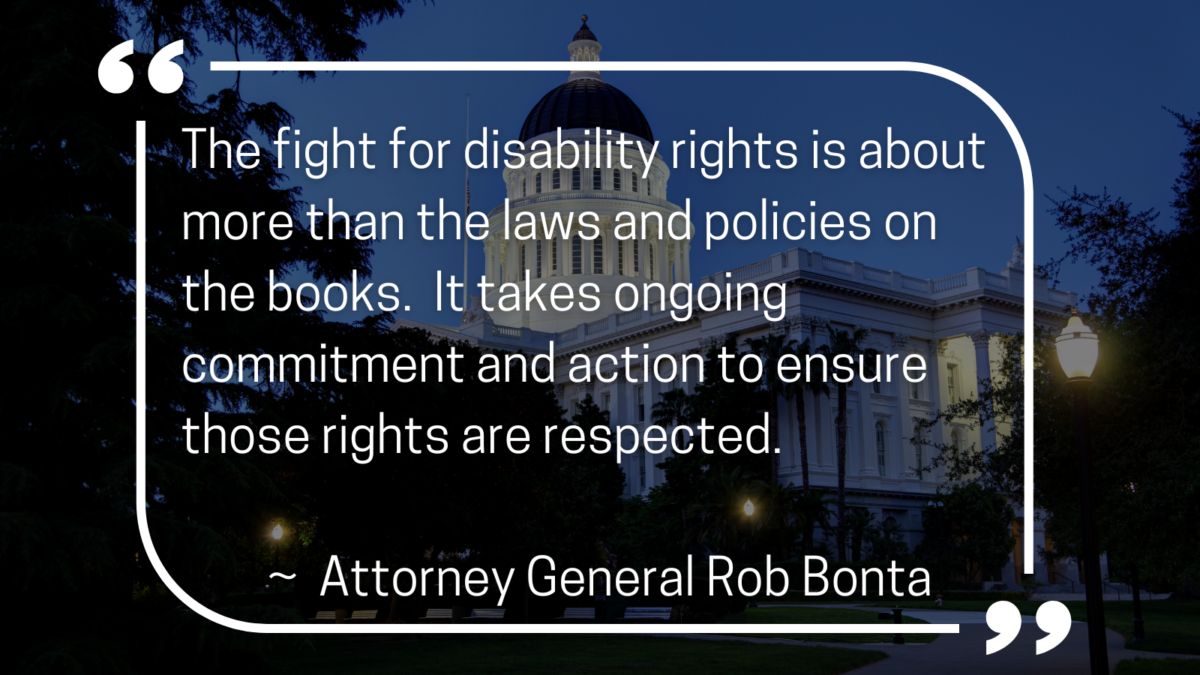California Attorney General Rob Bonta today issued four separate letters to remind local officials across the state of key legal protections under California law meant to uphold the civil rights of people with disabilities. In the letters, the Attorney General urges local leaders to renew their commitment to combatting discrimination and enforcing the state’s disability access laws and regulations so that people with disabilities have equal access to services and facilities, housing, governmental proceedings, and all other spaces that are open to the public.
“The fight for disability rights is about more than the laws and policies on the books,” said Attorney General Bonta. “It takes ongoing commitment and action to ensure those rights are respected. Today, I’m calling on local officials across the state to recommit themselves to upholding the civil rights of Californians with disabilities. Every single person — including persons with disabilities — deserves equal access to housing, education, government, and all public spaces. We owe it to the more than 60 million Americans living with disabilities to take action against discrimination here in California and across the nation. Disability rights are human rights.”
Californians with disabilities have historically experienced widespread discrimination in areas such as housing, education, employment, and public accommodations. While California’s disability rights laws are designed to address such discrimination, the California Department of Justice continues to receive complaints that, among other things, Californians with disabilities are being denied basic rights in public accommodations and continue to experience physical access barriers and service animal denials. State and federal disability access laws mandate equal access for people with disabilities and prohibit discrimination in public accommodations and housing. In order to ensure the civil rights of people with disabilities are respected, local enforcement is critical. The Attorney General is calling on district attorneys, city attorneys, county counsel, city and county governments, and building officials to renew efforts to address any violations of disability rights laws and strengthen existing standards and policies across the state.
In the four separate letters covering a range of issues affecting Californians with disabilities, the Attorney General urges local officials to:
- Take steps to improve compliance with the state’s disability access laws amongst business establishments and in public accommodations;
- Review land use and zoning policies and practices to further fair housing, and adopt reasonable accommodation ordinances;
- Evaluate government meeting facilities and platforms to ensure current policies, practices, and technology provide equal access to local public proceedings; and
- Ensure architectural accessibility in buildings by reviewing and updating policies and protocols for accessible design standards.
In addition to sharing guidance with local officials across the state, the Attorney General is highlighting new information available on the California Department of Justice’s website to support people with disabilities by uplifting federal, state, local, and community-based resources. More information on supports available for people with disabilities is available here.
The Attorney General is also announcing a new webpage to provide resources for small businesses, especially those that have been the subject of private litigation or are concerned about their potential liability for accessibility violations. The page is designed to help businesses address physical barriers and support accessibility so as to be in compliance with the Americans with Disabilities Act. More information is available here.
A copy of each of the four separate letters sent to local officials is available here.

